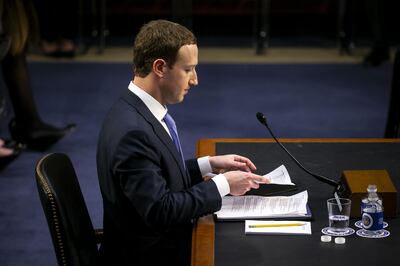Facebook boss Mark Zuckerberg has accepted personal responsibility for the leak of data on tens of millions of its users, warning of an "arms race" against Russian disinformation during a high-stakes hearing with US lawmakers.
In his first formal congressional appearance, the Facebook founder and chief executive answered questions for nearly five hours as he sought to quell the storm over privacy and security lapses at the social media giant that have angered lawmakers and the network's two billion users.
Under mounting pressure over the hijacking of its user data by a British political consultant, Mr Zuckerberg reiterated his apology for the historic breach, before being grilled over how Facebook collects and protects people's personal information.
"It was my mistake, and I'm sorry," he said of the improper sharing of 87 million people's information by Cambridge Analytica, a firm working for Donald Trump during the 2016 presidential campaign.
"I started Facebook, I run it and I'm responsible for what happens here."
He added that Facebook fell short in protecting the platform, noting: "That goes for fake news, foreign interference in elections and hate speech, as well as developers and data privacy."
_______________
Read more:
_______________
The 33-year-old CEO spoke of a constant struggle to guard against Russian manipulation of the Facebook platform to influence elections in the US and elsewhere.
"There are people in Russia whose job it is to try to exploit our systems and other internet systems and other systems as well," he said.
"So this is an arms race. They're going to keep getting better and we need to invest in getting better at this too."
The Facebook boss has previously acknowledged the social network failed to do enough to prevent the spread of disinformation during the last US presidential race.
The Senate hearing, ahead of another appearance in the House on Wednesday, featured several tense and some friendly exchanges on the social network's security, hate speech and other topics.
Of the hundreds of questions he faced, none appeared to flummox him more than Senator Dick Durbin's pointed query about where he slept the previous evening.
"Would you be comfortable sharing with us the name of the hotel you stayed in last night?" Durbin asked.
Zuckerberg paused for a full eight seconds, chuckled, grimaced and ultimately demurred.

"Um, uh, no," he said.
And "if you've messaged anybody this week, would you share with us the names of the people you've messaged?" the Illinois Democrat persisted.
Again, a similar unwillingness to answer.
Perhaps more than any other senator during five hours of questioning, Durbin's everyman tactic put a finger on the crux of the issue surrounding Facebook's handling of its users' private data.
_________________
Mark Zuckerberg says free version of Facebook will always be there
_________________
Zuckerberg said he was open to regulation, but cautioned against complex rules that might impact emerging social media firms.
"The internet is becoming increasingly important in people's lives and I think we need to have a full conversation about what is the right regulation," he told the hearing.
"You need to be careful (a new regulatory policy) doesn't cement in the current companies that are winning."
Zuckerberg also revealed that Facebook is cooperating with the US special prosecutor investigating Russian interference in the 2016 vote.
"Our work with the special counsel is confidential. I want to make sure in an open session I don't reveal something that's confidential," he said.
Zuckerberg said he had personally not been contacted, and that he was not specifically aware of any subpoena of Facebook data.
"I believe there may be (a subpoena), but I know we're working with them," he said.
Swapping his customary T-shirt for a business suit and tie, the Facebook chief appeared sombre as he fielded tough questions over Cambridge Analytica's massive data breach.
"We've been working to understand exactly what happened with Cambridge Analytica and taking steps to make sure this doesn't happen again," he said in his prepared remarks.
But the show of contrition fell short for several lawmakers.
"We've seen the apology tours before," Senator Richard Blumenthal of Connecticut told Zuckerberg.
"And so, my reservation about your testimony today is that I don't see how you can change your business model unless there are specific rules of the road."
________________
Facebook suspends data firm in wake of privacy scandal
________________
Dozens of protesters gathered outside Congress before the hearing wearing Zuckerberg masks and #DeleteFacebook T-shirts.
Inside the jammed hearing room, activists from the Code Pink group wore oversized glasses with the words "STOP SPYING" written on the lenses, and waved signs that read "Stop corporate lying."
Testifying was a new step for Zuckerberg, who started Facebook as a Harvard dropout in 2004, and built it into the world's largest social media company worth more than $450 billion.
During questioning, Zuckerberg rejected the suggestion that the social media giant, with over two billion users worldwide, has exclusive control over its market.
"The average American uses eight different apps to communicate with their friends and stay in touch with people, ranging from texting apps to e-mail," he said.
Zuckerberg also said the company believed in an ad-supported business model, but appeared to leave open the possibility of a paid version.
"There will always be a version of Facebook that is free," Zuckerberg told the hearing.







